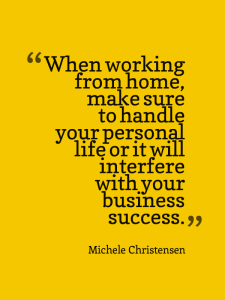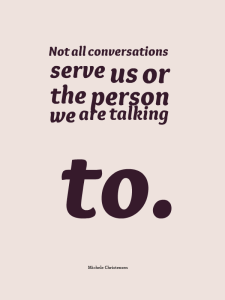One of the best things about working from home is that you can take care of chores and personal tasks whenever you want, even while you are working. One of the worst things about working from home is that you can can take care of chores and personal tasks whenever you want, even while you are working. 🙂
worst things about working from home is that you can can take care of chores and personal tasks whenever you want, even while you are working. 🙂
Having no clear boundaries between work and personal tasks can mean that the two tend to blur, and this can be great until it begins to cause problems. Sometimes it gets really hard to leave personal tasks undone and focus on the business. After all, if you are home all day why isn’t the house perfect, the papers filed, the fridge stocked, the mail sorted, the calls made, etc.?
I’ve found that if I don’t watch it, that my personal tasks can start to erode away valuable time spent on my business which can be detrimental. I’ve found a few ways to keep the personal tasks from expanding too much, and so I have 3 tips for you that will help keep those annoying personal tasks at bay so you can focus on your business.
- Create systems for things that pile up and nag you. For me, the worst offender is the mail. For an unknown reason, we get huge amounts of mail that needs to be dealt with. I did all the recommended steps to cut down on the mail, and still it regularly piled up. What I finally did was designate the first 15 minutes of every day to deal with the mail. Finally, this has gotten the accumulation down and keeps in check over the long haul. If your nagging, piled up task is laundry then find a way to fix it – designate a day, do a load every morning, send it out or go to a laundromat for a big session monthly. If it’s yard work, do some every day to wake up when the afternoon lull hits, hire someone to do it, or take an afternoon every other week. The point is, create some system for whatever your worst offender is so that it doesn’t nag you anymore.
- Designate time to crank out personal chores. Trying to do chores in small bits of time leftover from other activities often doesn’t work. You need time to get into something and finish it. If you only have 2 minutes, that rules out most tasks you could even thing about doing because it’s not enough time. If you start with half an hour, that’s enough time to not only start but finish many household tasks. I set aside some time right after lunch every day and just crank through the top few pressing things I need to do.
- Find your mental and physical productivity times. When are you at your best mentally? How about physically? Schedule tasks in a way that takes advantage of these times. If you’re a night owl, can you arrange you schedule to get some turbo-charged time late at night? If you have loads of energy for physical tasks in the morning, use that time to get them done.
I used to think that having a successful work-at-home business was only about being a good business person. Now I know you have to manage your personal life well too.
How do you keep your personal life from ruining your business? Share your tips in the comments.









